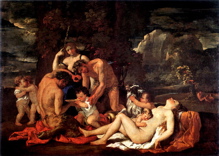Difference between revisions of "Nurture"
m (Text replacement - "http://nordan.daynal.org" to "https://nordan.daynal.org") |
|||
| Line 2: | Line 2: | ||
==Origin== | ==Origin== | ||
| − | [ | + | [https://nordan.daynal.org/wiki/index.php?title=English#ca._1100-1500_.09THE_MIDDLE_ENGLISH_PERIOD Middle English] ''norture'', ''nurture'', from Anglo-French ''nureture'', from Late Latin ''nutritura'' act of nursing, from [[Latin]] ''nutritus'', past participle of ''nutrire'' to suckle, [[nourish]] |
*[http://en.wikipedia.org/wiki/14th_century 14th Century] | *[http://en.wikipedia.org/wiki/14th_century 14th Century] | ||
==Definitions== | ==Definitions== | ||
| Line 9: | Line 9: | ||
*3: the sum of the [[environmental]] [[factors]] influencing the [[behavior]] and traits [[expressed]] by an [[organism]] | *3: the sum of the [[environmental]] [[factors]] influencing the [[behavior]] and traits [[expressed]] by an [[organism]] | ||
==Description== | ==Description== | ||
| − | <center>For lessons on the [[topic]] of '''''Nurture''''', follow [ | + | <center>For lessons on the [[topic]] of '''''Nurture''''', follow [https://nordan.daynal.org/wiki/index.php?title=Category:Nurture '''''this lesson'''''].</center> |
The [[nature]] versus '''nurture''' debate concerns the [[relative]] importance of an [[individual]]'s innate qualities ("nature," i.e. nativism, or innatism) versus [[personal]] [[experiences]] ("nurture," i.e. [http://en.wikipedia.org/wiki/Empiricism empiricism] or [http://en.wikipedia.org/wiki/Behaviorism behaviorism]) in determining or causing [[individual]] differences in [[physical]] and behavioral traits. | The [[nature]] versus '''nurture''' debate concerns the [[relative]] importance of an [[individual]]'s innate qualities ("nature," i.e. nativism, or innatism) versus [[personal]] [[experiences]] ("nurture," i.e. [http://en.wikipedia.org/wiki/Empiricism empiricism] or [http://en.wikipedia.org/wiki/Behaviorism behaviorism]) in determining or causing [[individual]] differences in [[physical]] and behavioral traits. | ||
Revision as of 22:30, 12 December 2020
Origin
Middle English norture, nurture, from Anglo-French nureture, from Late Latin nutritura act of nursing, from Latin nutritus, past participle of nutrire to suckle, nourish
Definitions
- 1: training, upbringing
- 2: something that nourishes : food
- 3: the sum of the environmental factors influencing the behavior and traits expressed by an organism
Description
The nature versus nurture debate concerns the relative importance of an individual's innate qualities ("nature," i.e. nativism, or innatism) versus personal experiences ("nurture," i.e. empiricism or behaviorism) in determining or causing individual differences in physical and behavioral traits.
The phrase "Nature versus nurture" in its modern sense was coined by the English Victorian polymath Francis Galton in discussion of the influence of heredity and environment on social advancement, although the terms had been contrasted previously, for example by Shakespeare (in his play, The Tempest: 4.1). Galton was influenced by the book On the Origin of Species written by his cousin, Charles Darwin. The concept embodied in the phrase has been criticized for its binary simplification of two tightly interwoven parameters, as for example an environment of wealth, education and social privilege are often historically passed to genetic offspring.
The view that humans acquire all or almost all their behavioral traits from "nurture" was termed by philosopher John Locke tabula rasa ("blank slate") and proposes that humans develop from only environmental influences. This question was once considered to be an appropriate division of developmental influences, but since both types of factors are known to play such interacting roles in development, most modern psychologists and anthropologists consider the question naive—representing an outdated state of knowledge.
In the social and political sciences, the nature versus nurture debate may be contrasted with the structure versus agency debate (i.e. socialization versus individual autonomy). [1]
